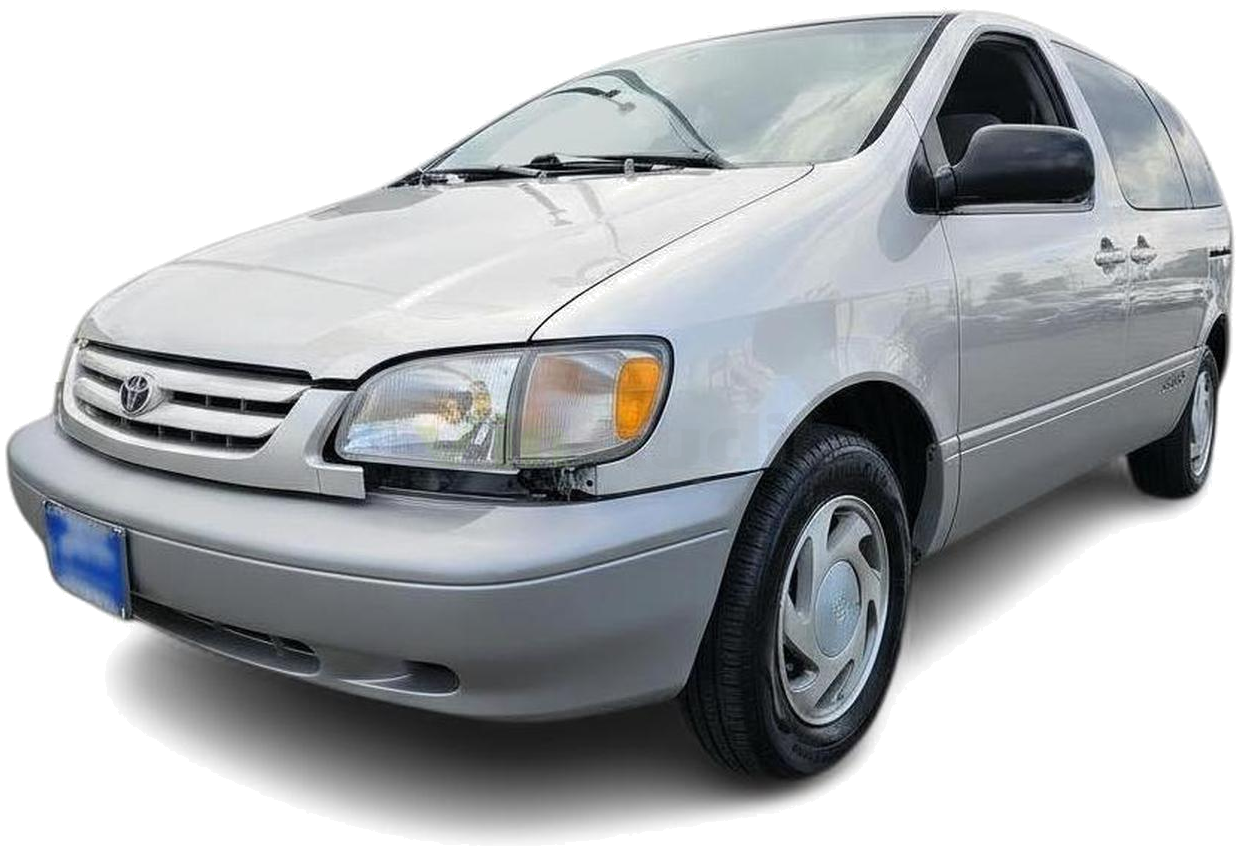The Good
The 1999 Sienna excels in its renowned Toyota reliability, offering peace of mind for families and practical low-maintenance ownership. Its comfortable ride, spacious interior, and decent fuel efficiency make long trips enjoyable. It represents excellent long-term value, providing dependable transportation that appeals to those seeking both emotional comfort and practical economy.
The Bad
Potential weaknesses for the 1999 Toyota Sienna include rust, particularly on the subframe and rocker panels, issues with the power sliding doors, and occasional power steering leaks. While generally robust, some owners report aging suspension components needing replacement, and the styling can be considered somewhat bland compared to flashier rivals.
1999 Toyota Sienna: Quick Overview
Key Specifications for the 1999 Toyota Sienna:
- Engine Option: The 1999 Sienna was exclusively powered by a robust 3.0-liter 1MZ-FE V6 engine. This engine was known for its smooth operation and strong reliability, sharing its lineage with the Toyota Camry.
- Horsepower: This V6 engine produced a respectable 194 horsepower at 5,200 rpm and 209 lb-ft of torque at 4,400 rpm, providing adequate power for daily driving and highway cruising, even when fully loaded.
- Fuel Economy: Fuel efficiency for the minivan was competitive for its era. EPA estimates typically ranged around 18-20 miles per gallon in the city and 24-26 miles per gallon on the highway, depending on driving conditions and maintenance.
- 0-60 MPH Times: The 1999 Sienna could accelerate from 0 to 60 mph in approximately 9.5 to 10 seconds. While not a speed demon, this performance was sufficient for merging onto highways and keeping pace with traffic.
- Towing Capacity: When properly equipped with the optional towing package, the 1999 Toyota Sienna had a maximum towing capacity of up to 3,500 pounds. This made it capable of towing small trailers, jet skis, or utility trailers, adding to its versatility.
- Trim-Level Features:
- CE: The base model, offering essential features like air conditioning, power windows and door locks, dual front airbags, an AM/FM stereo with cassette player, and anti-lock brakes (often optional).
- LE: Stepped up from the CE, adding features such as cruise control, a roof rack, an upgraded audio system (often with a CD player), alloy wheels, power heated outside mirrors, and often a single power-sliding door (driver's side).
- XLE: The top-tier luxury trim. This included dual power sliding doors, automatic climate control, a more premium audio system (often with a multi-disc CD changer), leather upholstery (optional), woodgrain interior trim, fog lights, and a more comprehensive set of power accessories.
1999 Toyota Sienna Specifications
Vehicle Information
| Year | 1999 |
| Make | Toyota |
| Model | Sienna |
| Trim | - |
| Style | - |
| Type | Sport Utility Vehicle Van |
| Category | Cargo Van |
Manufacturing Details
| Made In | United States |
| Manufacturing City | - |
Dimensions
| Doors | - |
| Curb Weight | - |
| Gross Vehicle Weight Rating | - |
| Overall Height | - |
| Overall Length | - |
| Overall Width | - |
| Wheelbase Length | - |
| Standard Seating | - |
Engine & Performance
| Engine | 3.0 L V-6 |
| Engine Size | 3L |
| Engine Cylinders | 6 |
| Transmission | - |
| Transmission Type | - |
| Transmission Speeds | - |
| Drivetrain | Front-Wheel Drive |
Additional Features
| Anti-Brake System | - |
| Steering Type | - |
Pricing
| Manufacturer Suggested Retail Price (MSRP) | - |
| Invoice Price | - |
| Delivery Charges | - |
Vehicle History Report
Specifications
History
Events
History Check
Check
Check
Check
Check
Listings
Recalls
Check
Analysis
What Problems Does the 1999 Toyota Sienna Have?
Another significant concern, particularly in regions with salted roads, is rust. Owners frequently report rust on the subframe, rocker panels, rear wheel arches, and even around the fuel filler neck. Thorough inspection for rust is crucial.
Power steering leaks are also a relatively common complaint, often stemming from the lines or the pump itself. While not always catastrophic, these leaks can lead to a loss of power assist if ignored.
Regarding the engine, the 3.0L 1MZ-FE V6 is generally robust, but some instances of oil sludge issues were noted in earlier versions of this engine if maintenance, specifically frequent oil changes, was neglected. While less prevalent in the 1999 model year compared to some earlier applications, it emphasizes the importance of a detailed service history.
The air conditioning system can also develop issues over time, with common failures including the compressor or leaks in the evaporator or condenser, leading to diminishing cooling performance. Worn suspension components, such as struts and bushings, are also common wear items at this age and mileage.
As for recalls, while specific campaigns vary by VIN and date, the first-generation Sienna has had recalls related to potential issues with the steering column, brake light switches, and certain components of the seat belt system. Prospective buyers should always check the NHTSA website using the specific VIN to determine any outstanding recalls. Overall, these issues are typical for a vehicle nearing its third decade; proactive maintenance significantly mitigates most of these concerns.
How long will the 1999 Toyota Sienna last?
This long-term durability stems primarily from the robust 1MZ-FE V6 engine and a durable automatic transmission, which often outlast other components. However, weaknesses emerge over time. Rust becomes a major concern in areas exposed to road salt. Suspension components like struts and bushings, power steering systems, and air conditioning compressors are common items that require attention with age and mileage. Power sliding door mechanisms are also prone to failure. Consistent fluid changes and addressing minor issues promptly are key to achieving maximum service life.
What Technology & Safety Features are Included?
Driver-assistance features, as we understand them today, were largely absent. There was no blind-spot monitoring, lane-keeping assist, or adaptive cruise control. The primary safety enhancements in this category were anti-lock brakes (ABS), which were optional on the base CE trim but typically standard on the LE and XLE models, offering improved stopping capability in slippery conditions.
In terms of passive safety, the 1999 Sienna came standard with dual front airbags for the driver and front passenger. Side airbags were not available for this model year. Other standard safety equipment included three-point seatbelts for all outboard seating positions and child-seat tether anchors. The robust body structure, designed on the Camry platform, aimed to offer a strong safety cage.
Crash-test ratings for the 1999 Toyota Sienna from the National Highway Traffic Safety Administration (NHTSA) were generally positive. It received five out of five stars for both driver and front passenger frontal impact protection, and also earned five stars for front and rear side-impact protection. The Insurance Institute for Highway Safety (IIHS) rated the 1999 Sienna as "Good" in its moderate overlap frontal test, which was a commendable score for a minivan of that era, indicating solid structural integrity and occupant protection.
What Colors Options are Available?
1999 Toyota Sienna Prices and Market Value
Minivans, in general, experience significant initial depreciation, but the Sienna's strong reputation for reliability helps it retain value better than many domestic competitors. Factors negatively affecting resale value include rust, non-functional power sliding doors, high mileage, and any deferred maintenance. Conversely, a clean title, a comprehensive service history, and a rust-free body significantly enhance its appeal and price in the used market.
1999 Toyota Sienna Cost of Ownership
1999 Toyota Sienna Fuel Efficiency
1999 Toyota Sienna Safety Rating
NHTSA
1999 Toyota Sienna Insurance
reasonable repair costs.
How Does the 1999 Toyota Sienna Compare to Other Sport Utility Vehicle Van?
In terms of performance, the Sienna's 194-hp V6 provided a smooth and adequate driving experience, feeling more car-like due to its Camry platform. It was generally competitive with, if not slightly less powerful than, the 2nd generation Honda Odyssey (which offered 210 hp) but often felt more refined than the domestic offerings. The domestics sometimes had more raw power options, but often at the expense of refinement and fuel economy.
Regarding features, the Sienna offered a solid array for its time, especially in LE and XLE trims with power sliding doors and automatic climate control. However, the Honda Odyssey often introduced more innovative interior configurations and storage solutions that the first-gen Sienna didn't quite match. Domestic rivals sometimes offered more optional "bells and whistles" but were often less robust.
Reliability is where the Sienna truly shone and often surpassed most of its competitors. Along with the Honda Odyssey, the Sienna consistently ranked among the most reliable minivans, particularly concerning its engine and transmission longevity. This was a stark contrast to the Dodge Grand Caravan and Ford Windstar, which frequently faced well-documented transmission and various mechanical issues that severely impacted their long-term dependability and resale value.
For price, the Sienna, like the Odyssey, commanded a higher new price and retained its value significantly better on the used market compared to the domestic brands. Its reputation for durability ensured it depreciated slower, offering better long-term value.
Recommended Alternatives:
- Honda Odyssey (1999-2004): The Sienna's closest and strongest rival. Offers similar outstanding reliability, often more innovative interior features, and slightly more power. A great "similar alternative."
- Toyota Highlander (early 2000s): If a minivan's sheer volume isn't absolutely necessary and some SUV characteristics are desired (like optional AWD), an older Highlander could be a "better alternative" for some, though with less ultimate passenger and cargo capacity.
- Mazda MPV (early 2000s): A "similar alternative" that offered a sportier driving feel, though its reliability generally didn't quite match Toyota or Honda.
Final Verdict: Is the 1999 Toyota Sienna a Good Sport Utility Vehicle Van?
It is absolutely worth buying, but exclusively as a used vehicle. Look for examples that have been well-maintained, ideally with a verifiable service history. Crucially, seek out rust-free units, particularly in regions where road salt is used, and ensure the power sliding doors (if equipped) function smoothly. The LE or XLE trims offer a more desirable blend of features and comfort. Avoid neglected Siennas with significant rust or deferred maintenance, as even reliable vehicles can become money pits without proper care. A good 1999 Sienna offers exceptional value and many more years of service.

